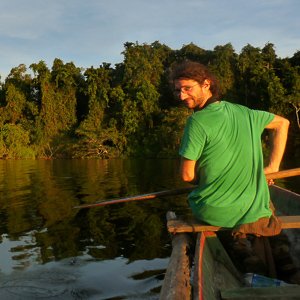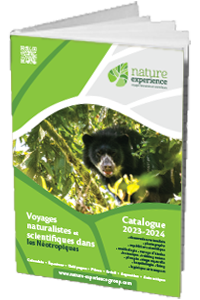Your travel expert
Dorian Noël
Naturalist and scientific travel expert

Chocó-Darien, in western Ecuador, has been classified as one of the 25 biodiversity hotspots requiring urgent protection. The Chocó covers 260,595 km2, stretching from Panama, along the western flank of the Andes mountains in Colombia and Ecuador, and ending in the north-western corner of Peru. Within this "hot spot", the western region of Ecuador has been included among the world's highest conservation priorities, as it is home to many endemic and threatened species, and urgent protection is essential to mitigate the causes of climate change. In this region, only 5% of the primary forest remains due to the growth of agriculture, and legal and illegal mines.
Proyecto Washu (PW) is an Ecuadorian organization created in 2011 and legally recognized by the Ecuadorian Ministry of the Environment as "Fundación Naturaleza y Arte" (FNYA). Its main objective is to protect the habitat of one of the world's 25 most endangered primate species, the Ecuadorian brown-headed spider monkey (Ateles fusciceps) in the forests of Ecuador's Chocó region. To achieve this, PW/FNYA is developing four programs aimed at mitigating the impacts of the main threats facing this species and its habitat. The action programs are as follows:
1) Scientific research
2) Environmental education for sustainability
3) Community empowerment
4) Ex-situ conservation and rehabilitation of the brown-headed spider monkey (A.fusciceps).

Today, we'll leave the capital early in the morning and head for the Jevon Forest reserve, located in the heart of Ecuador's Chocó region. Along the way, we'll be able to observe the different altitudinal ecosystems, as well as one of the greatest threats facing this type of area: the deterioration of the forest due to deforestation, which is reflected in the various monocultures present. After lunch, we'll walk to the Jevon Forest Biological Station, where we'll be spending the next few days. During this first contact, we'll observe several villages and communities surrounding the reserve and enjoy our first wildlife sightings in one of the region's rare remnants of primary forest, with significant biological diversity. In the evening, the Jevon Forest team will give us an introductory talk.
Dinner and overnight in the reserve.
transfer from Quito to the reserve, local naturalist guide.
After a hearty breakfast, we'll start the day with a walk along the reserve's trails. Our guide will explain the dynamics of this ecosystem, its particularities and the links between the flora and fauna present. We'll look for bird and primate species associated with this biodiversity-rich region, some of which are difficult to observe and listed as endangered, such as the Banded Ground-Cuckoo (Neomorphus radiolosus), the Long-wattled Umbrellabird (Cephalopterus penduliger), the Buffon's Macaw (Ara ambiguus) and the Brown-headed Ecuadorian Spider Monkey (Ateles fusciceps). We'll return to the house for lunch, and in the afternoon, we'll follow one of the researchers on the camera-trap wildlife monitoring project. We'll talk about the protocol used in the reserve for this study and visit the places where the cameras are placed to retrieve the information, which will later be analyzed at the station. We'll be able to observe the species photographed, such as the Puma (Puma concolor) and Jaguar (Panthera onca), among others, and talk to the researchers about the importance of this technique for biodiversity analysis. After dinner, we'll take a night walk in search of amphibians, reptiles and arthropods. We'll have the opportunity to observe the charismatic chachi frog (Hypsiboas picturata), the Mashpi stream frog (Hyloscirtus mashpi), the pygmy boa (Trachyboa boulengeri), the tropical fly lizard (Echinosaura keyi) and a variety of phasmids, arachnids and amblypygids, among other nocturnal species.
All activities mentioned in the text, lectures by researchers (lectures by researchers may vary according to the dates of the trip), local naturalist guide.
Today, we'll spend the morning walking in the reserve's estuary area, to more deeply understand the relationship between the Chocó's flora and fauna and the bodies of water. During this walk, we'll be able to observe species associated with aquatic ecosystems, such as Kingfishers, Herons and other bird species. We'll visit the waterfall, where we'll have time to relax and enjoy a tarzan-style liana jump. In the afternoon, we'll accompany the researchers in their search for mammals, by following their tracks. We'll learn how to observe their presence and differentiate between species based on the shape of their footprints and other types of tracks. While tracking, we'll make plaster casts of the tracks we find. At night, we can take a nocturnal tour to observe different species of birds and nocturnal mammals such as the Spectacled Owl (Pulsatrix perspicillata) and the kinkajou (Potos flavus), as well as amphibians and reptiles.
All activities mentioned in the text, lectures by researchers (lectures by researchers may vary according to the dates of the trip), local naturalist guide.
In the morning, we'll visit a sustainable cocoa production farm "Nacional Fino de Aroma". One of Washu's projects with local communities in the buffer zone of the Jevon Forest reserve is the production of chocolate with a different approach. The aim of developing these community-based production activities is twofold: on the one hand, to protect the forest and the species present in the communities' territory, and on the other, to create sustainable economic alternatives for their inhabitants, such as sustainable cocoa production. After lunch, we'll enjoy an artisanal chocolate tasting session, so that we can return to Quito with the best taste in our mouths.
box-lunch, chocolate tasting, transport back to Quito, local naturalist guide.
Departures are possible all year round. Contact us for the best periods to suit your priority study topics.
You want a personalized departure date? Contact us. Request a personalized date
Price per person depends on the size of your group. Please contact us for more information.
You are a group of travelers and want a special rate? Contact us. Request a personalized quote
To book your tour, please confirm your agreement in writing to your local agent.
The agency declines all responsibility for the provision of confirmed services in the event of non-compliance with the above payment terms.
Itineraries may be subject to last-minute changes due to natural disasters or changes in domestic legislation. The operator therefore reserves the right to make any changes necessary to guarantee the safety and integrity of travelers and to comply with current legislation. Hotels are subject to availability at the time of booking. In the event of unavailability, a hotel of the same category will be offered whenever possible.
Formalities: Passport valid 6 months after your return date. No visa currently required for French and Belgian nationals.
Vaccines: You are advised to be vigilant when traveling, especially during the rainy season (when infectious outbreaks can occur) in the coastal provinces and in Amazonia. Malaria is a parasitic disease transmitted by mosquito bites, requiring the use of personal protective measures such as sprays, creams, electric diffusers and mosquito nets.... Quito and the center of the country are not affected by malaria. In fact, very few areas are actually affected by these parasitic diseases. The majority of these high-risk areas are not in the zones we visit on our itineraries. However, if you decide to take a course of treatment, beware: some people react badly to it. Although no vaccinations are compulsory, we advise you to consider vaccinations against tetanus and hepatitis A and C as essential. We also recommend that you consult your GP before departure, and take out insurance to cover medical expenses and repatriation.





Travel theme |
Scientific travel |
|---|---|
Arrival city |
Quito (other departures possible) |
Departure city |
Quito (other destinations possible) |
Accommodation |
Standard lodges |
Physical condition |
Moderate |

